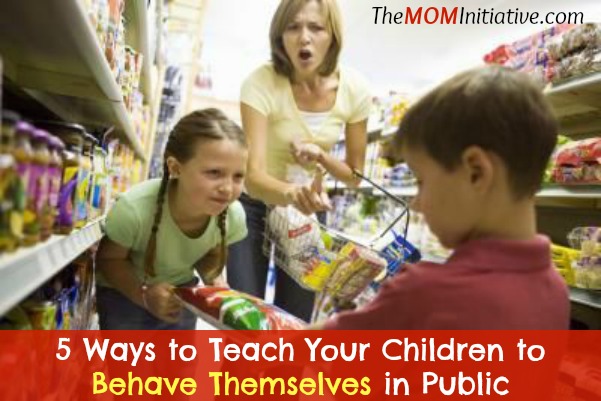It’s almost inevitable. Kids behaving badly in public and moms wanting to hide under a rock.
It happens to the best of moms!
So what’s a mom to do when her child begins to behave badly in public? How can a mom teach her children to behave themselves?
1. Begin setting very clear expectations at a young age. Even when your children are only about two, you can convey your expectations to them and when you have defined the ‘code of conduct’ for your household, your children will begin internalizing those expectations and make them their own.
Remember, clear expectations come with certain consequences when those expectations aren’t met. It doesn’t mean your children will never misbehave, but if you set clear expectations that are accompanied by certain consequences if those expectations aren’t met, then your children will know those expectations are real and important.
Example: If your children begin whining in the store and pitching a fit because they want something, then the clear expectation needs to be, “If you whine or start acting up because you want something, the automatic answer will be no. If you ask nicely, I will consider whether or not we can get what you’re asking for.”
2. Make your house rules, heart rules. Behavior is the evidence of character and character is a matter of the heart. You can make rules but if you don’t work on tucking integrity and character in the heart of your child, eventually, he/she will no longer feel bound by your rules because he/she does not feel the need to do what you say any longer.
For example… interrupting others is not only rude, it’s disrespectful and it’s important that we teach children not to interrupt when they are young so they don’t grow up to be adults who are rude and disrespectful. (That’s why I absolutely LOVE the Interrupt Rule).
But when they don’t follow the rule, it’s important to not only have clear consequences but also disciple the heart of your child. The consequence might be that they have to sit in time out for 5 minutes or something that is relevant for your circumstances and location, and age-appropriate, as well. But you also want to shepherd their heart.
Perhaps when you get home, you could sit down together and role play about how they could handle it better and share various verses about respecting others.
Verses like Philippians 2:3, “Don’t be selfish; don’t try to impress others. Be humble, thinking of others as better than yourselves.”
3. Teach your children how to become problem solvers. Many time children feel frustrated because they can’t do something or figure it out on their own. Parents often become their problem solvers, so they go to them for every little thing and never learn to figure things out on their own. A parents job is not to answer every question and solve every problem for their kids. A parents job is to teach children to do those things on their own.
Example: When you children ask you how to do something, rather than answering it for them, ask them how they think it should be done and walk them through the process. Help them learn to think for themselves, don’t think for them.
4. Instill a missional mentality in the heart of your kids. Children naturally think of themselves but a parent can help children think beyond themselves by caring for the needs of others. This will help them become more considerate of others in their surroundings.
Example: If your children are rambunctious, someone could get hurt. Maybe they like running around the grocery store but the elderly lady who needs a cane to keep herself steady is flustered because she knows that if they bump her, she would fall. In order to help your children see how important it is to care for those around them by behaving themselves, you could take them to the home of an elderly friend or a senior citizens home and have them help clean their house or their room, or make them a meal and explain how hard it is for them to do those things on their own.
Teaching children to care for others will help them think beyond themselves and be more aware of their behavior when they are around others.
5. Point out good and bad behavior in others. You’ll want to be cautious when you do this because you don’t want your children to become judgmental or begin comparing themselves with others. But you do want them to see the difference between good and bad behavior when demonstrated by others.
Example: You’re at the grocery store and the little girl in front of them begins whining to get a candy bar. She starts getting loud and acting up. Once you’ve left the store and gotten in the car, that’s a great opportunity to discuss the way that little girl behaved and ask your child how it made him/her feel when he/she watched the little girl whining. You can also ask your child to describe the little girls behavior and ask if your child wants to convey that kind of behavior to others.
It’s also VERY important to do the same when you see another child behaving well.
This is definitely one you want to be sensitive about how you handle it, but they see behavior all around them. Good and bad. They are already taking mental notes about how others behave. You can carefully use some of those times when you see other children behaving well and behaving badly to help your children think through their own behavior.
There are no cookie cutter answers for every child because their are no cookie cutter children or cookie cutter moms. But these are some foundational ways to help your children behave themselves in public.
DO YOU STRUGGLE WITH YOUR CHILDREN BEHAVING THEMSELVES IN PUBLIC? SHARE YOUR STORY HERE.
And don’t forget to join the MOM conversation with us on Facebook!
- Ch…ch…ch…CHANGES Are Coming in 2017 for TMI - December 27, 2016
- What New Thing Are You Ready to See God Do in Your Life in 2017? - December 26, 2016
- Heaviness and Newness - December 23, 2016



